Reporting the outputs, outcomes and impacts of NIHR Research 2022 Update
NIHR has a responsibility to demonstrate the value and impact of the research activities it funds and supports. To help us do this we use a tool called Researchfish to collect detailed information, directly from holders of NIHR-funded research and career development awards, about their outputs, outcomes and impact. We use the information to demonstrate the need for further pioneering research for the benefit of patients, the public and the economy.
The next NIHR Researchfish submission window opens on 6 February 2023 and closes 4pm 16 March 2023.
How we use your data
The data you provide us annually informs the impact stories we showcase on our website and highlight through our social media channels. It is used to inform responses to information requests and parliamentary questions, and in reporting to our stakeholders. We have recently analysed data as part of the collaborative evaluation we are undertaking with Marie Curie assessing the impact of our combined investment in palliative and end of life care research. This year, we used the data you provided to help us understand how we are doing in our ambitions to support open access publishing and our progress in building capacity through investment in research. Information on the outputs, outcomes and impacts arising from NIHR awards provides vital data for our programme evaluations including the 10 year evaluation of the EME Programme. We are developing the ways in which we use our data to populate information on the NIHR Journals Library and the our Funding and Awards pages.
Find out more about the many ways in which we use the data you provide.
We know it can take time for research outputs, outcomes and impact to arise. Therefore, we maintain contact with you beyond the initial lifecycle of your award(s). This enables us to capture as much information as possible on the work you have done and the benefits achieved.
Our use of Researchfish
NIHR has 13,250 personal and research awards in Researchfish, tracking information on the outputs, outcomes and impact of our funded research. In 2022, 89.3% of awards expected to provide a submission did so. NIHR began using Researchfish in 2012. During this time NIHR awards have reported:
 9,871 influences on policy and practice
9,871 influences on policy and practice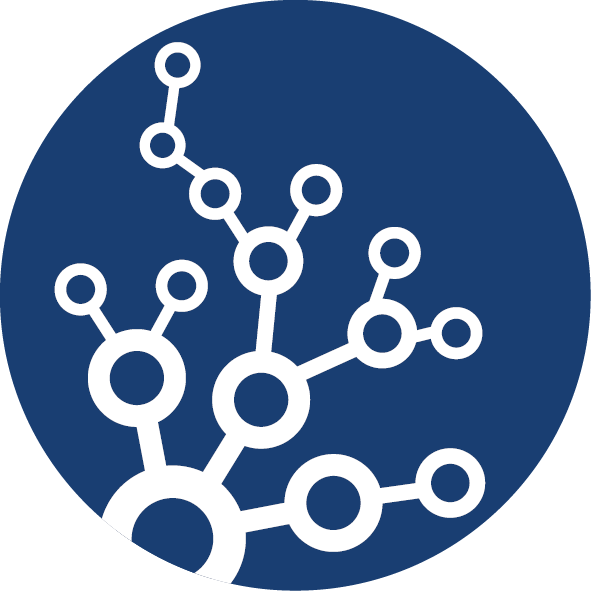 45,109 engagement activities
45,109 engagement activities  75.6% awards report involving patients and public
75.6% awards report involving patients and public  21,233 collaborations and partnerships
21,233 collaborations and partnerships 1,118 (88.4%) NIHR Academy award holders reported that they had achieved their ambition to pursue an academic/clinical academic career
1,118 (88.4%) NIHR Academy award holders reported that they had achieved their ambition to pursue an academic/clinical academic career  1,143 new datasets
1,143 new datasets 79,642 publications
79,642 publications
Influencing policy
NIHR award holders have provided evidence to Government reviews, inquiries, committees and forums. This has informed policy and decision-makers, the NHS and life science sector to help turn better knowledge into better care.
Contributing to clinical governance and influencing key health and care services, organisations and companies, means that future policy directions are informed by high quality research evidence.
Another productive way to maximise the usefulness of research is to participate in National consultations. NIHR award holders report preparing responses and contributing to such consultations to highlight challenges, suggest improvements and provide support to service planning and commissioning.
“At the height of the COVID-19 pandemic we contributed to a UK-Ireland statement on the importance of maintaining evidence-based ESD and community stroke services, which was highlighted in a webinar delivered by the World Stroke Organisation and featured on the World Health Organisation website."
Dr Rebecca Fisher, Principal Research Fellow & Stroke Association Senior Lecturer, University of Nottingham, NIHR Health and Social Care Delivery Research programme (HSDR) funding
"We have formed a consortium with hepatologists, microbiologists, experts in AMR, Policymakers, UKRI funders and MPs and the All-Party Parliamentary Group (APPG) on Liver Disease and Liver Cancer. This consortium aims to determine strategies to combat the challenges of antimicrobial resistance in chronic liver disease. We've presented to the APPG and have shown that faecal microbiota transplantation may be one way of reducing antimicrobial resistance in chronic liver disease".
Professor Debbie Shawcross, Professor of Hepatology and Chronic Liver Failure, King’s College London
NIHR Research for Patient Benefit programme (RfPB) funding
Ways in which NIHR award holders report influencing policy and practice
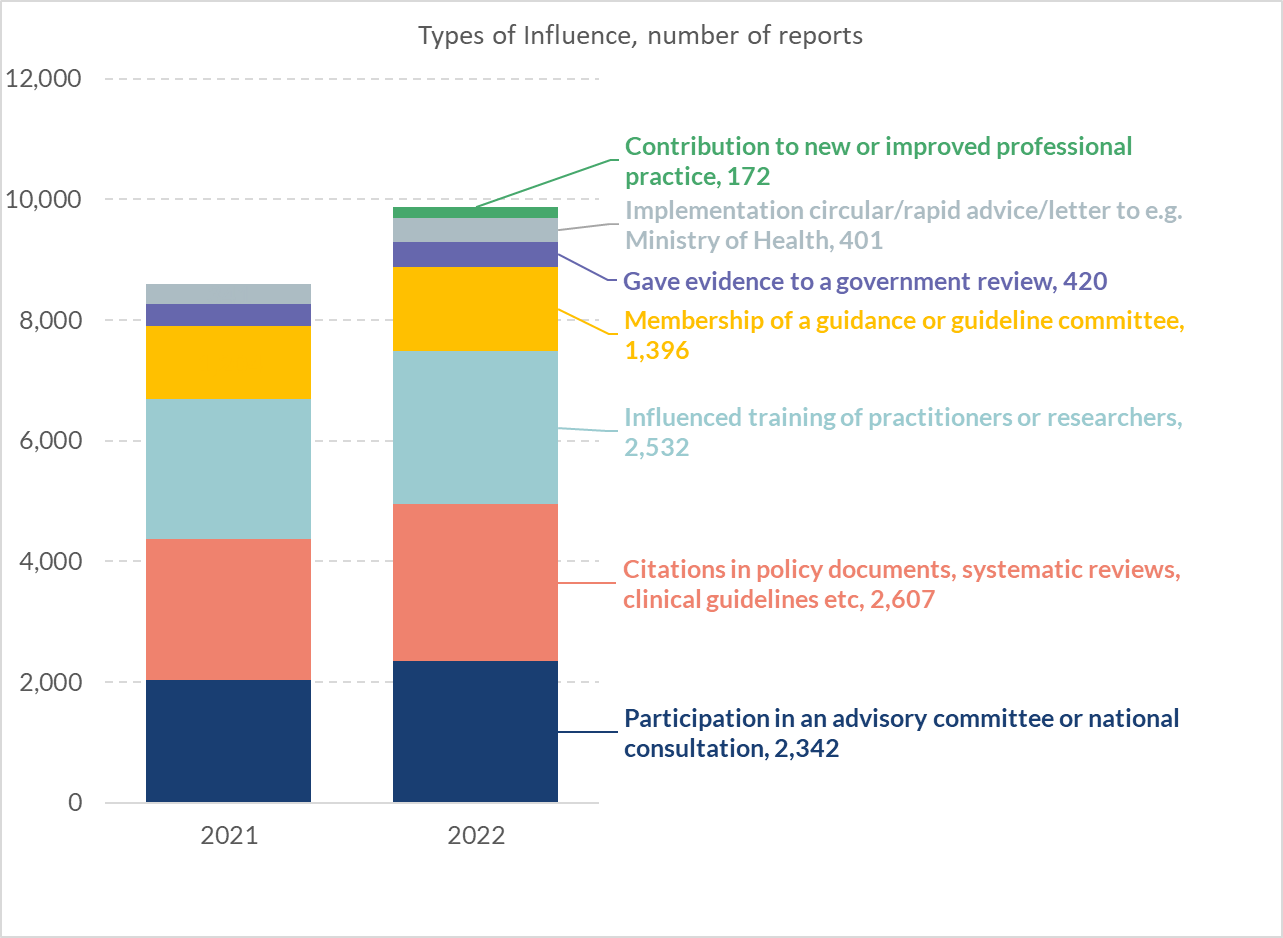
The numbers of reported influences on policy and practice by type of influence:
Participation in an advisory committee or national consultation, 2,342, 23.73%
Citations in policy documents, systematic reviews, clinical guidelines etc, 2,607, 26.41%
Influenced training of practitioners or researchers, 2,532, 25.65%
Membership of a guidance or guideline committee, 1,396, 14.14%
Gave evidence to a government review, 420, 4.26%
Implementation circular/rapid advice/letter to e.g. Ministry of Health, 401, 4.06%
Contribution to new or improved professional practice, 172, 1.74%
Influencing Practice
Our Researchfish data tells us where NIHR research findings have been influencing the development of practice. Our award holders report that they are doing this by:
- presenting or submitting evidence to inform local or national guideline development
- informing and influencing review of clinical practice, social care and wider healthcare
- preparing policy documents and responding to proposals from public bodies and organisations which have subsequent impacts on health and care
- updating systematic reviews of the evidence base to inform policy and decision-making.
It is when research findings change the course of care or treatment that research really makes its impact on health and well-being. A crucial step in developing health and care practice is to ensure that findings from research inform guidelines and training information.
“Thanks to our contribution to a national consultation exercise about the relaxation of measures to protect the public from risks of prion disease, the MHRA decided with our support, to allow the use of plasma in manufactured products for life saving treatments for critically ill patients. These products are currently in short supply and this limits decisions on prescribing (eg IVIg treatments). The potential commercial value for using these products could be many tens of millions pounds.”
Professor Simon Mead, Deputy Director Medical Research Council Prion Unit, University College London (UCL)
NIHR Senior Investigator
The influence that up-to-date research has on education programmes run by Higher Education Institutions (HEIs), and in training programmes for health and care practitioners and researchers is an important area of NIHR impact. In 2022, we were informed of 2,532 reported instances of our award holders feeding their findings directly into the education, training and professional development of others.
“Our research demonstrated that treatment delays within the care pathway at the first episode of psychosis were contributing to poorer outcomes. We showed that this was mainly occurring within mental health services as young people disengaged from services. I was part of the NHS England advisory group to shape the first 'waiting time standard' for access to the specialised early intervention service in psychosis teams. This is now policy and all Trusts are working to the standard of treatment access 2 weeks after referral.”
Professor Max Birchwood, Professor of Youth Mental Health, University of Warwick
NIHR Programme Grants for Applied Research (PGfAR) funding
“Our review was used as evidence to underpin NHS healthcare practice relating to the identification of and treatment for smokers who are pregnant. An independent evaluation undertaken by the University of Manchester estimated that this change in practice has led to 20%, or 600, fewer stillbirths in England per year.”
Professor Tim Coleman, Professor in Primary Care, University of Nottingham
NIHR Programme Grants for Applied Research (PGfAR) funding
Keeping patients at the heart of research
Since 2016, NIHR award holders have been asked to describe how patients are involved in their research and to explain the difference it makes. We’ve worked closely with other funders to develop a common Patient and Public Involvement (PPI) question set for use in Researchfish. This replaced our previous NIHR question set in 2018 and is now in use by 18 other funders in the United Kingdom, Europe, North America and New Zealand.
We have analysed the most recently submitted data about PPI from 6,986 awards to provide a snapshot of involvement in 2022:
- 5,278 (75.6%) awards reported involving people in their research in different ways.
- 1,708 (24.4%) awards either did not involve people or involvement was not relevant for their award.
Involving patients and the public in research is a requirement for NIHR, but in some cases patient and public involvement may not be applicable, for example if the award is focused on research method development, or in those awards that do not directly fund research but fund people.
Researchfish data demonstrates how involving patients and the public in research can enhance the reach, quality and impact of research, and that involving people provides wider perspectives and opens new directions for future research.
Members of the public are helping to improve the relevance and quality of research questions; just over 75% (5,278) of NIHR award holders told us that they had used input from individuals and groups to make sure they are asking the right research questions. More than 4,174 (18.1%) reported that patients and the public had been involved in the design of their research.
Patient and public involvement tails off over the life cycle of the award with this trend seen in comparative data from other funders. In the early stages of research activities (such as identifying research questions, study design and development) patient and public involvement is widespread, but involvement in the later stages of research (such as data analysis, writing up and sharing research findings) is much less common.

The numbers of reported involvements of patients and the public by type of involvement at each stage of the lifetime of the NIHR award are:
Research design: 4,174
Prioritising research question: 3,375
Developing funding application: 3,228
Undertaking the research: 2,009
Management of the research: 1,913
Analysing and interpreting data: 1,244
Writing up:1,006
Dissemination of findings: 1,867
Implementing findings: 625
Other/not specified: 373
NIHR award holders tell us that the main challenges surrounding PPI are finding the ‘right’ people to involve and maintaining relationships and continuity over time. We are using this intelligence to continue to reflect and develop the ways we can better support NIHR award holders to involve people throughout their research.
What have been the challenges of involving patients and the public in NIHR research?
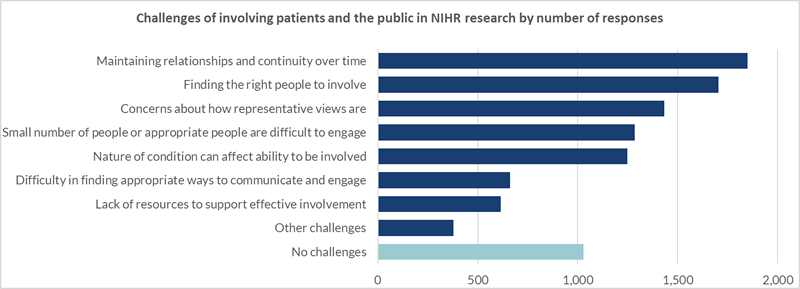
The challenges of involving patients and the public in NIHR research by number of responses:
Maintaining relationships and continuity over time, 1,850, 13.7%
Finding the 'right' people to involve, 1,704, 12.6%
Concerns about how representative views are, 1,432, 10.6%
Small number of people or appropriate people are difficult to engage, 1,285, 9.5%
Nature of condition can affect ability to be involved, 1,248, 9.3%
Difficulty in finding appropriate ways to communicate and engage, 661, 4.9%
Lack of resources to support effective involvement, 615, 4.6%
Other challenges, 379, 2.8%
No challenges, 1,028, 7.6%
“PCAF: Having a PPIE team at the heart of my research meant that I sought opportunities to learn about this essential aspect of research more deeply, attending a series of one-day workshops with the UCL Train and Engage team. These led to participation in collaborative artist-researcher events, allowing me to learn from multiple disciplines about their aspirations for public-engagement. Attending these events led to a successful funding bid with a local artist for a Train and Engage award in 2020 entitled: ‘Embracing the power of art and tea to create positive changes in practice that better support children with speech, language and communication needs’. During my UCL Master’s in Research I also created a website for PPIE, and was invited to speak about this at a Royal College of Speech and Language Therapists’ Clinical Excellence Network”
Dr Jenny Ray, Highly Specialist Speech and Language Therapist, Homerton Healthcare NHS Foundation Trust,
HEE/NIHR Pre-doctoral Clinical Academic Fellowship
"The PPI panel has been invaluable in the funding application and development of documents for regulatory approval. The panel have been enormously helpful in developing patient-facing information and led on the development of the trial website. The PPI panel have also informed staff training and the implementation group (for implementation of the trial intervention)."
Professor Craig Smith, Professor of Stroke Medicine, University of Manchester,
NIHR Research for Patient Benefit (RfPB) Programme funding
Global collaboration
Working with others is key to interpreting the results of research, sharing research findings and working out how findings can be applied in practice. Analysis suggests that researchers who collaborate internationally are most likely to be impactful.
The data you have provided shows that NIHR award holders are highly collaborative. Over 61% of reported collaborations are with partners based in the UK, but there is also strong global collaboration, further extending the potential for greater dissemination and impact of NIHR research. 214 NIHR award holders indicate collaborations reaching across more than one continent.
Locations of collaborations with NIHR awards reported since 2012
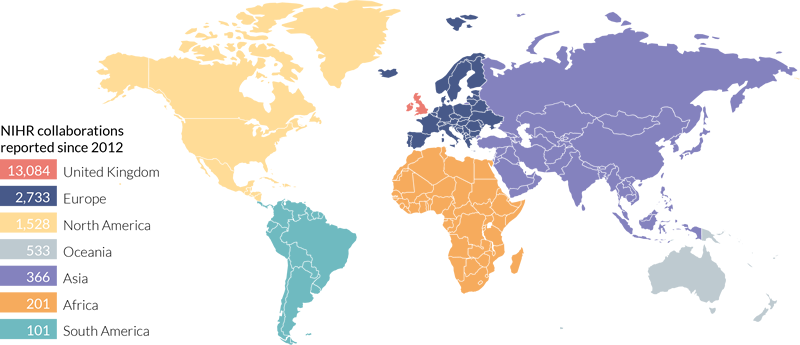
Locations of collaborations with NIHR awards:
United Kingdom, 13,084
Europe, 2,733
North America, 1,528
Oceania, 533
Asia, 366
Africa, 201
South America, 101
The benefits we have gained from collaborations include:
- sharing and disseminating research findings
- reinforcing existing collaborations and developing new partnerships for future work.
- sharing information used in business cases for commissioning and developing new services.
- informing education and training programmes and promoting good practice amongst peers.
“My collaborating partners in neurodevelopment at Southampton, Oxford and internationally have contributed through supporting me, by providing expert advice in the design and development of novel international, standardised neurodevelopment assessment tests (the INTER-NDA and the OX-NDA) for young children and in the analysis and writing up of the data. This resulted in my primary research output - the first international standards of early child development, constructed according to the WHO’s prescriptive guidelines. These standards were constructed using data from Oxford's INTERGROWTH-21st Project, whose primary aim was to develop international prescriptive standards of foetal and newborn growth. With my collaborators at Southampton, I extended my research in human brain development during the first 1000 days of life by applying the INTER-NDA to study patterns of typical and atypical neurodevelopment in children exposed to various adverse early life influences including undernutrition (the Women First RCT in India, Pakistan, DRC and Guatemala; and the Pakistan MCBCRS), generational poverty (the Omama Project, Slovakia and Saving Brains Grenada, West Indies) and infectious diseases (Zika and Chikungunya viruses, West Indies). I also developed an extension of the INTER-NDA test to 1 year olds (the OX-NDA); this was validated in the Pelotas 2015 Birth Cohort in Brazil.”
Dr Michelle Fernandes, Academic Clinical Lecturer & MRC Clinical Research Training Fellow; MRC Lifecourse Epidemiology Centre University of Southampton; Registrar (GRID) in Neonatal Medicine; Department of Neonatology, Princess Anne Hospital, Southampton and Honorary Senior Research Fellow, Nuffield Department of Women’s & Reproductive Health, University of Oxford.
NIHR Academic Clinical Fellowship
“St Francis University College of Health and Allied Sciences fielded a team of academics to work with us to develop a course suitable for UK and sub-Saharan Africa on Digital Communication for Health and we piloted it with 25 medical students at St Francis in July 2017. In January 2018 the St Francis team delivered the course independently to 22 medical students.”
Professor Frances Griffiths, Professor of Medicine, University of Warwick
NIHR Health and Social Care Delivery Research programme (HS&DR)
Investing in people
In 2016, NIHR Academy introduced the Researchfish Career Tracker and Your Award question sets to capture the career progression of NIHR Academy Members. These questions explore issues such as the experience of undertaking an NIHR award, how much time award holders spend on research and future career plans. Analysis of the information allows us to develop its training and support programmes and track outcomes.
For the 2022 submission period, 1675 award holders provided information in response to the Your Award questions. Our analysis shows that 89.8% of respondents who undertook an NIHR Academy award did so because they wished to pursue or further their academic or clinical academic career.. In addition, 88.4% reported that they had achieved their objective by undertaking their NIHR Academy award.
1867 award holders provided information in response to our Career Tracker questions; this data shows that 75.3% of those who completed an NIHR Academy award remain in an academic or clinical academic role. Of those who returned to clinical practice, 87.2% remain involved in research.
Trends in post-award roles of NIHR Academy Members
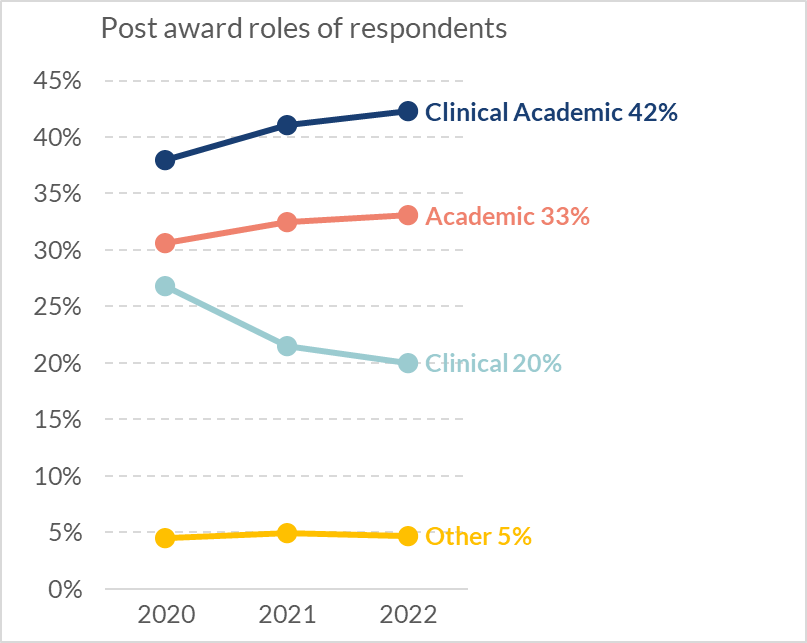
The change in percentages of post award roles of NIHR Academy members between 2020 and 2022. Y-axis range 0% -45%.
Clinical Academic: 37% to 42%
Academic: 30% to 33%
Clinical: 27% to 20%
Other: 5% to 5%
“The greatest benefit from undertaking my NIHR award was that it gave me time away from my clinical role to think about research. Prior to this award I would use my weekends to attempt to write, look for funding opportunities etc. However, that approach is unsustainable in addition to a full-time clinical caseload during the working week. My NIHR award confirmed my passion for research and gave me a taste of what PhD life would be like - it allowed me to develop the skills required to undertake a PhD, including time management, organisation and project management skills.”
Miss Lauren Lucas, University of Manchester
HEE/ NIHR ICA Programme Pre-doctoral Clinical Academic Fellowship
“Through completing my award, I realised that I wanted to pursue a career in academia and go on to become a leading researcher. Before the award, I never thought that I could ever go on to do a PhD and work in academia, yet here I am. The award allowed me to explore my options and gain confidence in myself and my potential. I want a career that positively impacts the wider public and I believe that all the skills I have gained from my fellowship has allowed me to go down that path.”
Miss Molly Wells, University of Leicester
NIHR Pre-Doctoral Fellowship
“There have been a huge range of benefits, but if I choose just one it would be confidence that I can plan and deliver a sizable research project. This has myriad constituent components, including skills like securing ethical approval, academic writing, project management, developing collaborations etc. It has also confirmed to me that research is something that I enjoy and this has made me determined to make it part of my future career.”
Dr Howard Ryland, University of Oxford, NIHR Doctoral Fellowship
“It was transformative for my career - a wonderful experience and I will always be grateful to NIHR for giving me the opportunity. It led to me being awarded a personal chair in palliative care (a few months before the end of my fellowship). Chairs in palliative care are very rare, and this would not have happened without my NIHR CS fellowship.”
Professor Katharine Sleeman, King's College London
NIHR Clinician Scientist Award
Generating new knowledge
Datasets and collections of data
Making research data available so that it can be effectively re-used by the scientific community benefits numerous research-related activities, such as:
- reproducing analyses
- testing secondary hypotheses
- developing and evaluating novel research methods
- design of future trials
- meta-analyses
- teaching
- helping to prevent error, fraud and selective reporting
In our NIHR position on the sharing of research data we set out our support for sharing of data in the most appropriate way, and that we are committed to support open access to research data to help deliver research that maximises benefits to patients and the wider public, the health and care system, and which contributes to economic growth in the UK.
Information about data sets generated by NIHR awards and reported to us through Researchfish helps us to understand how they are being used to underpin research collaborations, facilitate further research activities and to inform policy and guidelines. In 2022 45.0% (514) of those reporting data sets or collections of data said that they had been provided to others.
“This dataset is a record of annual water fluoride concentrations in Lower Super Output Areas (LSOAs) in England from 2009 to 2020. We obtained information on the fluoride concentrations for each water supply zone through requests made under the Environmental Information Regulations 2004 to water companies in England. The Water Supply (Water Quality) Regulations SI 2016/614 require that water companies take a minimum of 1-8 annual samples per water supply zone, per year (dependent on population size) of water fluoride concentrations, as part of routine water quality monitoring. This dataset was created by merging the supplied information on annual fluoride concentrations in each water supply zone, with the 2011 LSOA population-weighted centroids (Office for National Statistics). This dataset has allowed the team for the LOTUS study to assign water fluoridation exposure to individuals. This will inform the analysis of how effective and cost-effective water fluoridation is for adults. This is the first time that a publicly available database of water fluoride concentrations at small area (LSOA) level has been available. This will be very valuable for other research on water fluoridation”
Deborah Moore, Research Associate: Specialist in Dental Public Health, University of Manchester
NIHR Public Health Research (PHR) programme funding
Publications
NIHR award holders share research findings targeted at other academics through journal articles, conference abstracts and proceedings, and writing book chapters. There is a steady growth in the number of publications reported to us, plateauing from 2020 into 2021. During the last ten years a total of 79,642 outputs published from NIHR awards reported in Researchfish.
Number of publications reported by year of publication
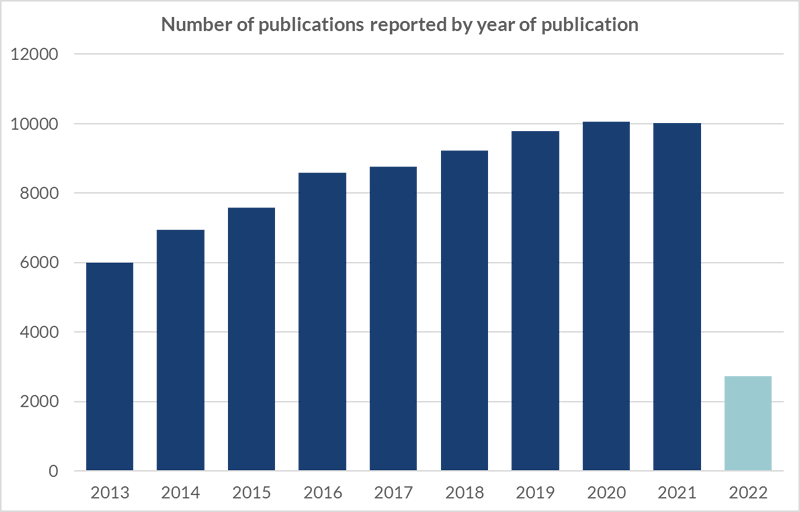
Increasing numbers of reported publications by year of publication, from 2013 to 2021, with partial figures for 2022:
Year 2013: 5,951 publications
2014: 6,949
2015: 7,584
2016: 8,582
2017: 8,755
2018: 9,226
2019: 9,776
2020: 10,053
2021: 10,007
2022: 2,719
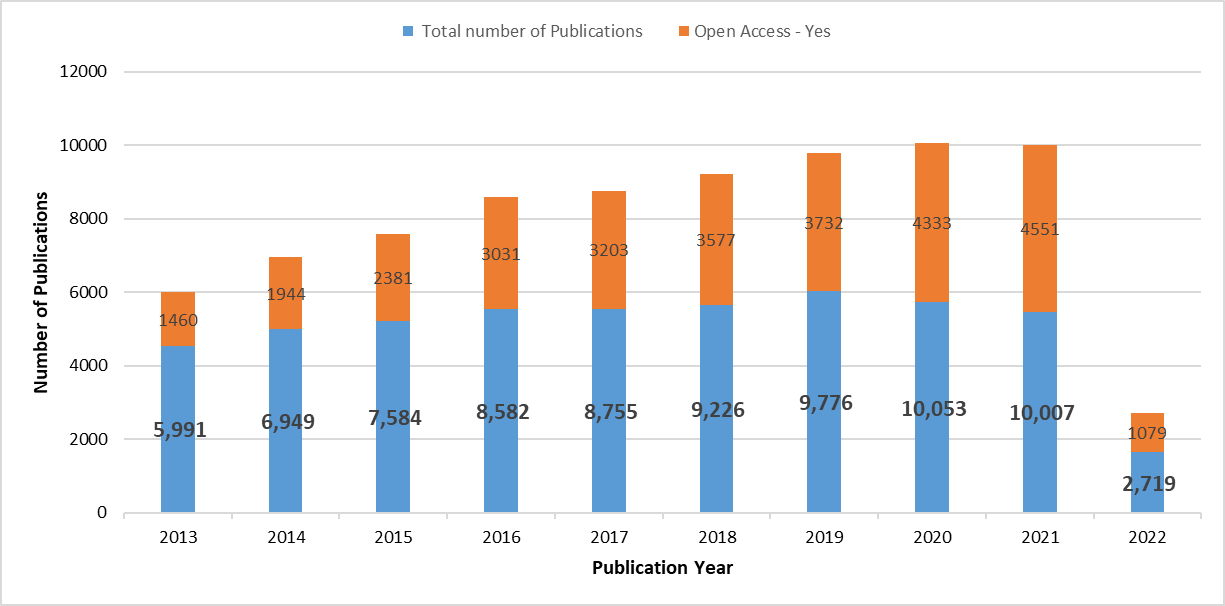
In November 2021, following an extensive review, we announced our new Open Access policy,which requires all peer-reviewed research articles submitted from 1 June 2022 arising from NIHR-funded studies to be made immediately open access under an open licence. The policy will ensure that NIHR funded research findings are freely accessible, discoverable and reusable to all, maximising the societal, academic, and economic impact of NIHR funded research. It will empower patients and the public, and enhance the integrity and rigour of research through greater openness and transparency. The review of the policy involved extensive engagement with stakeholders including patients and the public.
The new policy builds on the progress we made under our previous open access policy. Analysis of the available open access information provided through Researchfish shows that policy resulted in a steady growth in the percentage of all publications that are open access over the last 10 years.

Increasing percentage of reported open access publications by year of publication, from 2013 to 2021, with partial figures for 2022:
2013: 24%
2014: 28%
2015: 31%
2016: 35%
2017: 36%
2018: 38%
2019: 38%
2020: 43%
2021: 45%
2022: 37%
The NIHR Open Access policy is focused on our expectations in relation to publishing academic, peer-reviewed journal articles – but this is just one way in which our researchers may choose to disseminate their research findings. We recognise and encourage diverse approaches to disseminating research findings suited to different audiences. Beyond academia, NIHR award holders publish a wide range of other materials including consultancy reports, policy briefings, technical reports and standards and working papers. Publications of different kinds capture the knowledge from NIHR funded research that can be shared in a variety of formats to meet stakeholder needs.
Reducing unnecessary bureaucratic burden in research
We are exploring ways in which we can minimise unnecessary research bureaucracy, with the primary aim of freeing up the research community to concentrate on delivering the high-quality research that patients, the wider public and our economy needs.
We work closely with other funders (including UKRI and AMRC charities), HEIs and research organisations to coordinate the activity surrounding the collection of outputs, outcomes and impacts with Researchfish. Where feasible, we adopt a shared approach with a view to reducing the administrative burden of reporting.
Ongoing developments continue to improve the interoperability between Researchfish and many different sources of information, enabling outputs data to be gathered from other sources such as ORCID, Europe PMC, Crossref, DataCite and GitHub. This greatly reduces the manual input of information required by award holders. Use of the unique NIHR award reference in outputs aids the automated identification of NIHR outputs.The majority of publications that are reported by NIHR awards holders in Researchfish are sourced from other systems by the automatic recognition of these references in funding acknowledgments.
We remain committed to ensuring that the submission process is as straightforward as possible. You can access our regularly updated guidance and downloadable resources on our website.
Contact the NIHR Researchfish team for more support and information by emailing evaluation@nihr.ac.uk
This Digital Object Identifier (DOI) https://doi.org/10.3310/rfupdate-2022 provides a permanent link to this report and its metadata.

